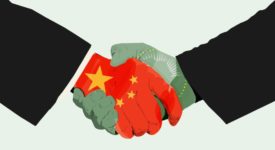EUBULLETIN talked in an interview with Ms. Valerie Svobodova, who is an UN expert, working with the Task Team on Learning Coordinator of the Global Protection Cluster that is a part of the United Nations High Commissioner for Refugees (UNHCR).The views expressed in this interview are solely those of Ms. Svobodova in her private capacity and do not in any way represent the views of the United Nations.
EUBULLETIN: Unlike many, if not most, leaders both at the EU and national level, you have a very intimate experience with the very critical situation on the ground in many parts of Sub-Saharan Africa and the Middle East hit by conflicts and natural disasters. You frequently travel to the conflict and war-torn areas in these regions – what is the focus and purpose of your mission?
V.Svobodova: I work for the Global Protection Cluster, which is supporting the field when planning and delivering of activities for the most vulnerable affected population, children, women as well as men, elderly people, or people with disabilities. Those groups of internally displaced persons, whose needs are often overseen in humanitarian response, and those who need special attention. My work focuses on building the capacity of humanitarian actors, including national government, local and international NGOs as well as UN agencies, so as to deliver a more coordinated, efficient and accountable humanitarian response.
EUBULLETIN: When you look at the humanitarian crisis in the Mediterranean that is still unfolding and that the EU has been trying to deal with, and with your experience in various African and Middle Eastern countries, can you see any correlations between long-term policies of European powers towards these countries – often characterized as benign neglect or exploitation – and the current influx of refugees?
V.Svobodova: We tend to look at the situation around the Mediterranean crisis as a separate issue or problem. However, the current crisis really starts in the conflict-torn countries, and unless we address, mainly at the political level, the causes of the unbearable life conditions, we will barely keep up with the needs of asylum seekers and refugees trying to get to Europe.
We should understand that many people are in a situation where they no longer have a choice but to leave their home, their families and countries and leave for a very uncertain future. European people tend to put all asylum seekers and refugees into one box or category, although they face different challenges, they have different stories and reasons why they had to leave everything behind.
EUBULLETIN: The controversial system of quotas recently put forward by the European Commission seems to be only a short-term solution. What would, in your view, be a long-term solution, if there were any at all?
V.Svobodova: I don’t think the number of asylum seekers and refugees will decrease in the near future – on the contrary, we cannot hide behind quotas but we need to seek a more comprehensive solution, addressing the causes of the crisis as well as providing long-term solutions. There is no simple answer regarding long-term solutions. Immigration policies, political dialogue between European governments and the governments in the conflict-hit countries but as well as perceptions about immigration in various European countries, and providing conditions for refugees so that they can build a meaningful life rather than live in isolation.
In Europe, we have been, for a long time, very homogenous and with the world fast evolving we need to change our mind-set, open our minds, to bridge the differences between cultures, so that we become more welcoming to other cultures. I would see it more than as an opportunity than as a burden.
EUBULLETIN: The current influx of migrants, or the ‘surge from the sea’, as The Economist has characterized it, has spawned ever-stronger opposition across Europe, both among the population at large and also in political circles. What message would you convey to your fellow Europeans?
V.Svobodova: The European people can no longer pretend to be isolated from the rest of the world and live in their rather comfortable bubble. I would wish to see that Europe grasp the situation as an opportunity to expand, to be more multicultural and take advantage of the positives that those refugees can bring to European societies and economies. Many of the asylum seekers are highly skilled, educated and above all motivated people – therefore, if we provide them with opportunities, the effect will even spill into the economy.
EUBULLETIN: You have visited and helped people in need in places such a Syria, Eritrea, Sudan, Pakistan and many others that have become a synonym for human suffering and lawless blood-soaked roads. What would be one of the many human stories that have touched your heart and that you will always remember?
V.Svobodova: I will give you a very personal example: one of my colleagues whom I met during my mission in Syria the past November had to find the way how to leave the country, though it was with the high price tag – he had to leave without his family, with only one suitcase, leaving behind a good job and in fact all his life…
When he arrived in Sweden, he had to start from scratch, or rather from below zero, working as a volunteer for the civil society, sleeping in a room with many other asylum seekers and no certainty if he will ever see his parents again. When I asked him “Was it worth it?”, he was hesitating for a while, and then he said “Yes, because I had no other choice.” But back in Syria, I was at least a human, but I don’t know who I am any more.







